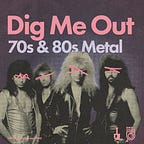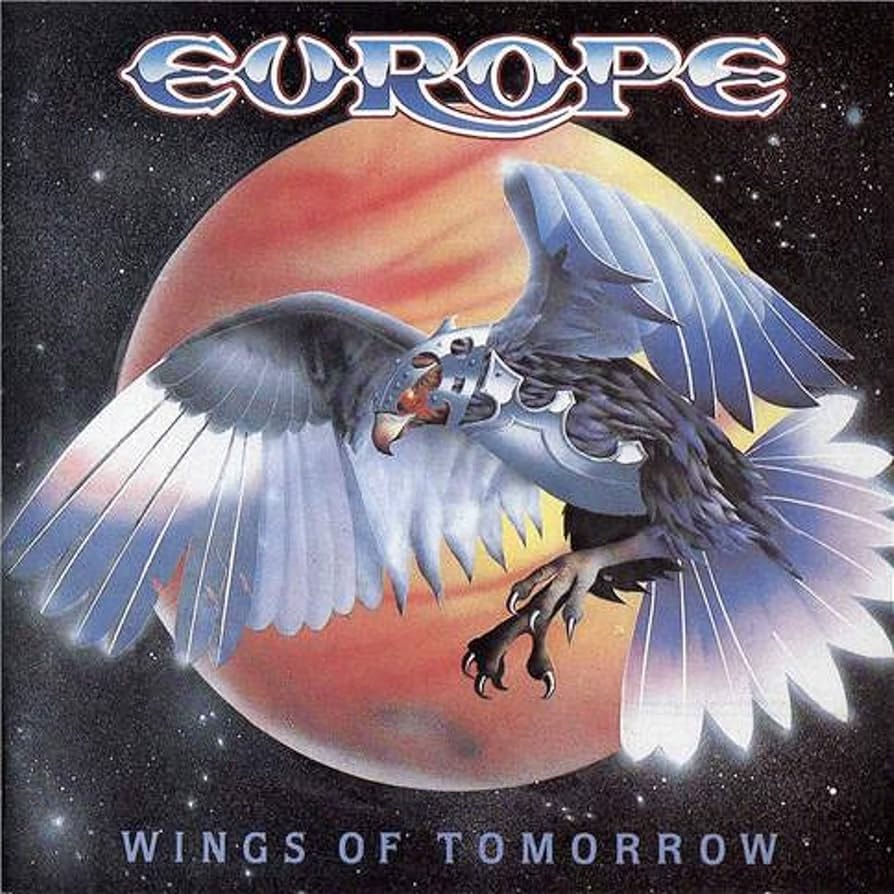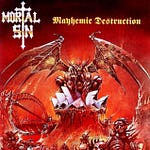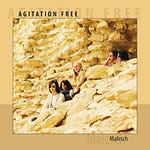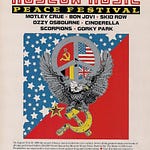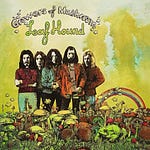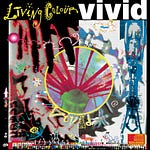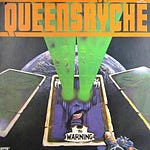Metal Union members, you’ve spoken! Europe’s Wings of Tomorrow has crushed the competition in our September showdown, edging out Skid Row’s 5x platinum monster debut, Vixen’s powerhouse female-fronted metal, and Black ‘n Blue’s Gene Simmons-produced insider project. Chip’s hunch about Europe’s rawer pre-Final Countdown era proved irresistible to voters who wanted to dig into the underground roots of Swedish metal royalty. Suggest the next album for our tournament—the Metal Union needs your picks to keep the deep dives coming.
Before Europe became the synthesized stadium rock machine that gave us “The Final Countdown,” they were actually a guitar-driven hard rock band with serious metal chops. And the proof? Wings of Tomorrow, their second album that sounds absolutely nothing like the Europe you think you know.
The Record Store Treasure Hunt
It’s the late ‘80s, and you’re browsing the bargain bins at Camelot Music. Among the “nice price” cassettes sits this unassuming album with an airbrushed eagle that screams “1970s van art.” You grab it because, hey, it’s Europe, and you recognize the name from MTV. But when you drop it into your Walkman, something’s off. Where are the keyboards? Where’s that distinctive synth sound that made them famous?
What you’re hearing instead is pure Swedish metal fury, circa 1984. This is Europe before they discovered the magic of Mick Micheli’s keyboards, before producer Kevin Elson (Journey’s guy) polished them into radio gold. This is Europe as a four-piece guitar rock unit, and frankly, it’s revelatory.
The Real Europe DNA
Wings of Tomorrow captures something special—that sweet spot between the New Wave of British Heavy Metal and continental European metal that was emerging in the early ’80s. Think Dio-era Sabbath meets early Scorpions with a healthy dose of Ritchie Blackmore worship. At just 19 and 20 years old respectively, guitarist John Norum and vocalist Joey Tempest were already crafting songs that would make seasoned metalheads take notice.
The influences are written all over this record. “Stormwind” opens with a verse that could have been lifted straight from a classic Scorpions track. The instrumental “Aphasia” throws in some Iron Maiden-style galloping. And throughout, there’s this underlying Deep Purple/Rainbow foundation that would later become Europe’s signature sound on their modern albums.
But here’s what really catches you off guard: John Norum’s guitar work. This isn’t the keyboard-dominated Europe of popular memory—this is a guitar hero album disguised as a Swedish metal band finding their sound.
Guitar Wizardry in Disguise
Let’s talk about John Norum for a minute, because this album makes it crystal clear why guitar magazines kept featuring him in the ‘80s even when everyone thought Europe was just “that keyboard band”. Take “Scream of Anger”—Norum opens with this hollow, filtered guitar tone that sounds like the instrument is having a conversation with itself. It’s achieved through something as simple as a wah pedal held in position, but the effect is mesmerizing.
Then there’s the title track, “Wings of Tomorrow,” where Norum does something genuinely weird. He plays these inverted power chords at the end of the riff, creating this dissonant tension that you just don’t hear in typical pop metal. It’s a small detail, but it shows a band willing to experiment with darker, more complex sounds.
The guitar tones throughout capture that vintage ‘70s warmth—fuzzy when they need to be, clean and nuanced on the leads, never overly affected. This isn’t the reverb-drenched, heavily produced sound that would dominate later in the decade. It’s got grit, authenticity, and most importantly, it serves the songs rather than overwhelming them.
The Hooks That Almost Were
Here’s where Wings of Tomorrow gets interesting—and a bit frustrating. The guitar work is phenomenal, Joey Tempest’s vocals are distinctive and powerful, and the songwriting shows real promise. But those massive, stadium-sized hooks that would make “The Final Countdown” and “Carrie” instant classics? They’re not quite there yet.
Songs like “Treated Bad Again” and “Dance the Night Away” have all the pieces—great riffs, solid rhythms, memorable melodies—but they don’t quite stick with you the way you want them to. It’s like watching a band on the verge of figuring out their formula, which makes the album both compelling and slightly incomplete.
The closest they get to future Europe is probably “Dreamer,” a piano-driven ballad that hints at the band’s softer side without fully committing to the power ballad format. It’s got echoes of Queen if they’d gone heavier, but it lacks the emotional punch of later Europe ballads.
The Production Mystery
There’s an interesting production story here that might explain some of the album’s quirks. Drummer Tony Reno was apparently fired mid-process for lack of motivation and timing issues, with some of his parts allegedly replaced by drum machine. That might explain why the rhythm section feels a bit disconnected at times—there’s a weird artificial quality to some of the double-kick parts that stands out against the organic guitar tones.
But in a strange way, this production patchwork adds to the album’s charm. It feels like a document of a band in transition, capturing them at the exact moment between their underground metal roots and their future pop-metal stardom.
The Bigger Picture
What makes Wings of Tomorrow so fascinating is how it recontextualizes everything we know about Europe. When “The Final Countdown” exploded in 1986, many assumed they were a brand-new band riding the synthesizer wave. But this album proves they had two previous records of genuine metal credentials.
It’s a reminder that many of the bands we remember for their biggest hits had entire careers outside those moments. Europe wasn’t just lucky with a keyboard hook—they were skilled musicians with a deep understanding of hard rock and heavy metal, who happened to strike gold with a more commercial sound.
Wings of Tomorrow isn’t a perfect album. The hooks needed work, some of the production choices don’t quite land, and you can hear a band still figuring out exactly what they wanted to be. But as a glimpse into Europe’s real musical DNA, it’s absolutely essential.
This is the album that explains why John Norum was considered a guitar hero, why the band’s modern albums sound so authentically heavy, and why Europe was always more than just that synth-pop song your cousin played at her wedding. It’s guitar rock of the highest order, delivered by musicians who understood both metal’s power and melody’s importance.
For anyone who’s discovered Europe’s recent work and wondered where that sound came from, Wings of Tomorrow is your answer. It’s not the Europe you know—it’s the Europe they always were underneath.
Ready to hear how this underground gem influenced four decades of Swedish metal mastery? The full episode dives deep into John Norum’s guitar techniques, the band’s evolution from Force to Europe, and why this album deserves to sit alongside the era’s metal classics. Join hosts Jason, Tim, and Chip as they unpack every riff, debate the production choices, and argue over whether this is worthy album material or just a better EP. Listen to the complete discussion and discover what didn’t work for our hosts—you might be surprised by their final ratings.
Songs in this Episode
Intro - Stormwind
16:07 - Wasted Time
24:08 - Scream of Anger
30:18 - Wings of Tomorrow
33:32 - Dreamer
36:06 - Treated Bad Again
Outro - Dance the Night Away


